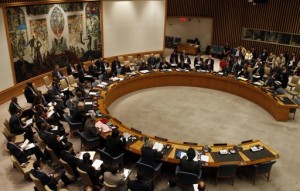 The U.N. Security Council delayed a vote on a new Syria resolution until Thursday in a last-minute effort to get key Western nations and Russia to agree on measures to end the dramatically escalating violence.
The U.N. Security Council delayed a vote on a new Syria resolution until Thursday in a last-minute effort to get key Western nations and Russia to agree on measures to end the dramatically escalating violence.
International envoy Kofi Annan contacted several governments Tuesday and urged the council to postpone Wednesday’s scheduled vote so its deeply divided members could “unite and take concerted and strong action that would help stem the bloodshed in Syria and build momentum for a political transition,” his spokesman Ahmad Fawzi said.
Annan said Wednesday’s bombing in the heart of Syria’s capital that killed three top regime members — including the powerful brother-in-law of President Bashar Assad and the defense minister — “only underscores the urgency of decisive council action,” Fawzi said.
U.N. Secretary-General Ban Ki-moon, who was visiting China, also urged the Security Council to “take collective action, with a sense of unity.”
Ambassadors from the five veto-wielding permanent council nations — the U.S., Russia, China, Britain and France — met behind closed doors Wednesday morning and agreed to Annan’s request to delay a vote.
Britain’s U.N. Ambassador Mark Lyall Grant said his country’s Western-backed text would be put to a vote at 10 a.m. EDT (1400 GMT) on Thursday.
The key stumbling block to an agreement on a Syria plan is the Western demand for a resolution threatening non-military sanctions. It is tied to Chapter 7 of the United Nations Charter, which could eventually allow the use of force to end the conflict.
Russia, a close Syria ally, is adamantly opposed to sanctions and any mention of Chapter 7 and has said it will veto any resolution that includes it. Although Western nations appear to have little appetite for force, Russia fears a repeat of the NATO campaign in Libya.
President Barack Obama called Russian President Vladimir Putin on Wednesday and they agreed that the growing violence in Syria heightens the need for a political transition.
However Russia’s Foreign Minister Sergey Lavrov pointed to Wednesday’s deadly bombing and accused the West of inciting the Syrian opposition, arguing that a proposed U.N. resolution amounted to support for the rebels and would lead to more bloodshed.
The mandate of the 300-strong U.N. observer force in Syria expires on Friday, and the Security Council must decide by then whether to extend it.
The unarmed observers were authorized for 90 days to monitor a cease-fire and implementation of Annan’s six-point peace plan — and the U.S. and its European allies contend that with violence escalating dramatically, there must be consequences for non-compliance.
Diplomats have been scrambling to try to get council to unify, which would send a much stronger signal to Syria.
A draft resolution supported by the Western powers would impose non-military sanctions against Assad’s regime if it fails to withdraw troops and heavy weapons from populated areas within 10 days — a key demand of the Annan plan. Moscow’s rival proposal calls for the “immediate implementation” of Annan’s plan and guidelines for a political transition approved at a meeting in Geneva last month, but makes no mention of sanctions.
Russia and China have incurred international criticism by twice vetoing U.N. resolutions to increase pressure on Assad.
A commentary that ran Tuesday in the official People’s Daily newspaper strongly opposed using force against Syria — a sign that China may again block the Western-backed resolution. It said “a political solution is the only way out of the Syrian problem.”
ABC News

Leave a Reply
You must be logged in to post a comment.